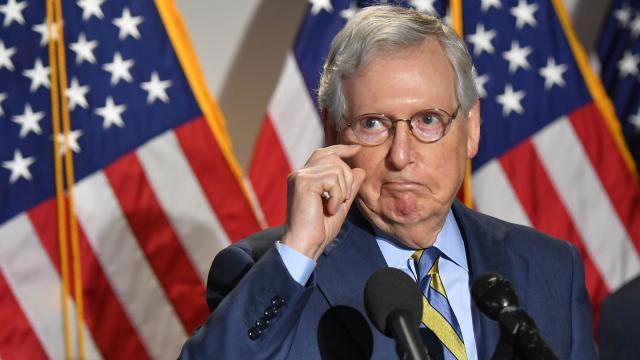Senate Majority Leader Mitch McConnell moved to block consideration of a House-approved stimulus package on Tuesday that includes $US2,000 ($2,627) checks for many Americans — an amount sought after by a rising chorus of Republicans and an outgoing President Trump.
McConnell moved to mask his desire to limit the relief payments to no more than $US600 ($788), the figure authorised in a package signed off on by the president Sunday, by using Trump’s own words against him. The president assured the country on Sunday that the Senate did, in fact, plan to start the process for voting on larger payments — but added that would happen alongside starting “an investigation into voter fraud” and repealing Section 230 of the Communications Act, the federal law widely credited with laying the groundwork for the modern internet.
[referenced id=”1522667″ url=”” thumb=”” title=”” excerpt=””]
McConnell’s framing of the three demands as somehow intrinsically linked, unable to be considered individually, is disingenuous at best. Senate Republicans have the power to launch their own investigation into the election should they actually desire to do so. But as the myriad election audits and recounts across the country have failed to supply any evidence of widespread voter fraud, the most likely outcome of a Republican-led probe is the further legitimization of President-elect Joe Biden’s victory.
Linking bigger stimulus checks to repealing Section 230 is little more than a poison pill. Even if there were resounding support for rewriting the federal law buttressing large swaths of the internet economy — which there is not — the debate over how to do so without effectively crippling the functionality of most of the internet’s most popular websites could take months, if not years, of planning.
McConnell’s linking of greater stimulus to Section 230 reform is no different than linking it to plans to build a base on the face of the moon: There is literally zero chance that Congress, should it even take such an idea seriously, could decide on how best to move forward in any practical time frame.
In the past two years, there have been numerous attempts to advance bills aimed at amending Section 230, both marginally and drastically. Largely these efforts have amounted to a political bludgeon, which is to say, not genuine efforts to reform the law as much as to rile up voters over the issue. None of these efforts have gotten very far.
This is largely because the actual consequences of tampering with Section 230 are hugely problematic. Outright repealing a law that protects internet companies from being drowned in lawsuits over user-generated content — the bread and butter of social media and other multi-billion dollar companies — would likely force them to eliminate much of the online speech on their platforms merely to shield themselves from civil liability. Put simply, repealing Section 230 would lead to far more online censorship, not less, thus having the exact opposite effect that Trump and his supporters seem to want.
Such a dramatic action would not only threaten the existence of many of the internet’s most popular websites, but the jobs of millions of workers, neither of which would be very popular politically. This all points to one conclusion: McConnell neither genuinely wants an investigation into the election nor a sudden conclusion to the Section 230 debate. What he wants is to keep that additional $US1,400 ($1,839) from finding its way into the hands of economically strapped Americans; people suffering, through no fault of their own, through the worst public health crisis in a hundred years.
